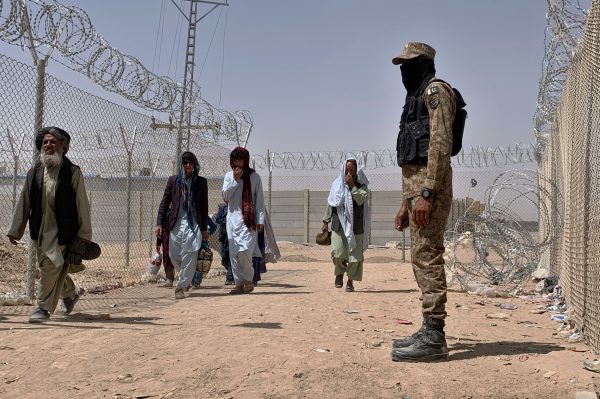Pakistani police in multiple raids detained at least 1,200 Afghan nationals, including women and children, who had entered the southern port city of Karachi without valid travel documents, officials said Thursday.
The arrests brought criticism from around Afghanistan after images of locked up Afghan children were circulated online. The detentions underscored the strained relations between the two South Asian neighbors.
Police and local government officials said the detainees will be deported to Afghanistan after serving their sentences or when the paperwork for their release is completed by their attorneys.
Pakistani officials claim that most of the detainees wish to return home.
Although Pakistan routinely makes such arrests, multiple and apparently coordinated raids were launched beginning in October to detain Afghans staying in Karachi and elsewhere without valid documents.
Gul Din, an official at the Afghan Consulate in Karachi, said he was in contact with Pakistan about a “quick and dignified return” of the Afghan citizens to their homeland.
Pictures of some Afghan children crammed into a cell of the central jail in Karachi went viral on social media, drawing appeals for their release along with their parents.
At least 139 Afghan women and 165 children are among those being held at a high-security jail in Karachi, according to a report released this month by Pakistan’s National Commission on Human Rights. The report was based on interviews with scores of imprisoned Afghan detainees.
In the Afghan capital of Kabul, Abdul Qahar Balkhi, a spokesman for the foreign affairs ministry, said embassy officials had expressed their concerns during meetings with their Pakistani counterparts.
“The Pakistani authorities have repeatedly pledged swift release of these detainees,” he told The Associated Press, saying that so far Pakistan had failed to “fully deliver on the commitment.”
“We believe that such degrading treatment of Afghans in Pakistan is not in the interest of any party,” Balkhi said. He said Afghans were advised not to enter Pakistan “unless absolutely necessary and without proper documentation.”
In Karachi, Murtaza Wahab, a spokesman for the Sindh provincial government, said police recently arrested only those Afghans who were residing in the province without valid documents. He said such detainees will be deported. He did not say how many Afghans were arrested for illegally residing in Sindh this year.
But Moniza Kakar, a lawyer who helps such Afghan detainees, said at least 1,400 Afghans were being held in Karachi’s jails. “We are not sure exactly how many Afghans are currently being held at jails in Pakistan. So far, we have facilitated the release of hundreds of Afghans to their country,” she said.
Kakar said some pregnant Afghan women who fled Afghanistan to seek medical treatment and for other reasons, are among those detained in Karachi and elsewhere in Sindh province. She said one of the female Afghan detainees recently gave birth to a child in the Hyderabad jail.
Kakar said dozens of Afghans were deported to Afghanistan last month after they completed their sentences, which are usually up to two months. However, she suggested that such sentences should be only verbal and symbolic — so that the detainees can be sent back to their countries quickly.

